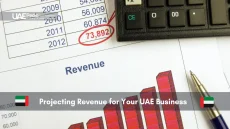What if a nation known for tax-free opportunities could still offer world-class advantages while adapting to global economic shifts? The United Arab Emirates answers this balancing act with its federal corporate tax system—a game-changer designed to fuel growth without stifling innovation.
Since June 2023, profits under AED375,000 are tax-free, while income above faces a 9% rate. This structure mirrors the Emirates’ strategy: nurturing small ventures while inviting larger enterprises to contribute sustainably.
We’ll unpack how this law reshapes opportunities for startups and established firms alike. From decoding terms like “taxable income” to exploring why these rates position the region as a global hub, consider this your roadmap through shifting sands.
Key Takeaways:
- Dual-rate system protects emerging ventures while scaling contributions fairly
- Strategic framework maintains competitive edge across industries
UAE Corporate Tax Overview
The UAE blends tradition with economic modernization how does such a place craft its financial future? It’s like reinforcing a bridge: local ventures stay agile, while compliance meets international benchmarks, evolving from a tax-free haven to a framework praised by organizations like the OECD. This shift isn’t sudden—it’s a calculated dance between local priorities and worldwide expectations.
Key Milestones in UAE Tax Reform
Over the past decade, reforms like VAT (2018) and economic substance rules (2019) laid groundwork for today’s system. These steps positioned the arab emirates as a partner in international efforts while protecting its entrepreneurial spirit. Repetitive metaphor—already used multiple times—local businesses keep their edge, but the structure meets global engineering standards.
“read also: Intellectual Property UAE Protection and Registration.”
How the Dual-Rate System Works
Here’s where it gets practical: profits below AED375,000 stay untouched (0%), while earnings above this threshold face a 9% rate. Why these numbers? They shield startups during fragile growth phases but ensure established players contribute fairly. It’s a tiered system—startups are sheltered, while larger firms contribute proportionately., while cargo ships support port maintenance.
This regime simplifies compliance through clear thresholds and digital reporting tools. For multinationals, it’s a nod to transparency; for local shops, it’s breathing room to scale. The rules aren’t just about revenue—they’re about reinforcing trust in a market that’s as dynamic as a Dubai sandstorm.
UAE Corporate Tax Rules for New Businesses
Navigating new regulations can feel like deciphering a treasure map—where’s the ‘X’ marking compliance? Let’s chart the course together. Whether you’re based in Dubai or run a branch from abroad, understanding local requirements transforms complexity into clarity.
Who Needs to Raise Their Hand?
Resident entities (those founded here) and non-resident entities (operating through local branches) both register. The trigger? Taxable income exceeding AED375,000 annually. Think of it like a metro ticket—ride free below the threshold, pay your fare above it.
Your activities determine what counts. A tech startup’s app revenue? Taxable. A consulting firm’s retainer fees? Also taxable. Even freelancers crossing the profit line join the system. Exemptions exist for government bodies and qualifying free zone businesses.
“read also: Government Support UAE Programs for Businesses.”
Key Deadlines and Penalties
Deadlines pivot on your license issuance month. Got yours in January? Submit by June 30. Licensed in July? You’ve until December 31. Miss the deadline? Expect penalties starting at AED10,000.
We’ve seen cafes scramble when forgetting seasonal income spikes. with a more general compliance example. Lesson learned: track earnings monthly, not annually. Government portals help streamline filings, but precision still matters.
Ready to get started with compliance? Gather trade licenses, financial statements, and ownership details. The process mirrors setting up a desert camp—methodical steps prevent sandstorms later. Now, who’s hungry for compliance?
Corporate tax registration and filing are mandatory and tied to the license issuance month, with penalties for late submission defined in Cabinet Decision No. 75 of 2023. Ref.: “Corporate Tax General Guide – FTA (2023)” [!]
Filing and Record-Keeping Essentials
Let’s face it—paperwork ranks somewhere between sand in your shoes and 50°C afternoons on the “fun scale.” But what if we told you compliance could feel less like a maze and more. Here’s your survival kit.
Corporate Tax Return Checklist
Mark your calendar: returns are due nine months after your tax period ends. A logistics company licensed in March 2022, for example, faced a December 2023 deadline. Their secret? Quarterly check-ins to update activity logs and AED transaction records.
Three non-negotiables for smooth sailing:
- Keep digital receipts for all business expenses
- Monthly reconciliation of revenue streams
- Clear separation of personal and company expenses
Financial Reporting Tips for UAE Tax
Think of financial reports as your company’s fitness tracker—they reveal strengths and flag risks. One tech startup avoided penalties by:
- Tagging all income sources (app sales, consulting fees)
- Tracking deductible costs down to printer ink
- Using government-approved accounting software
Remember: thresholds matter. Crossed AED375,000? Time to activate your VAT registration process alongside corporate filings.
Transfer Pricing Rules and Intercompany Dealings
Intercompany deals—like those between your Dubai branch and Paris HQ—now face closer scrutiny. Since starting June 2023, intercompany transactions require:
- Market-rate pricing for goods/services
- Documented justification for discounts
- Annual disclosure forms
One fashion retailer faced an audit after using “special rates” for European partners—their “special rates” for European partners triggered audits. Now they benchmark prices quarterly using industry reports.
Pro tip: Create a compliance roadmap matching your fiscal year. Color-code deadlines, automate reminders, and treat filings like client meetings—non-negotiable. Your future self will thank you when penalty seasons blow through like a shamal wind.
“read also: Employee Benefits UAE Standard and Additional Options
UAE Tax Exemptions and Special Cases
Ever felt like you’re deciphering a puzzle where half the pieces are hidden? The corporate tax law carves out exemptions as strategic shortcuts—if you know where to look. Let’s spotlight two paths: relief for smaller ventures and golden tickets for free zone players.
Who Qualifies for UAE Small Business Relief?
Think of AED3 million as your magic number. Businesses under AED3 million in taxable income can apply for 0% Small Business Relief.
One logistics startup redirected savings into drone deliveries after qualifying. Their secret? Tracking revenue streams separately and filing before deadlines. “Relief isn’t automatic,” notes a Ministry guide. “You must actively claim it during filings.”
“read more: Employee Compensation UAE Packages and Components
Free Zone Tax Benefits and Compliance Rules
Free zones still offer 0% tax—if businesses meet updated compliance rules. Qualifying income includes trading goods locally or manufacturing in designated areas. Non-qualifying? Earnings from mainland real estate or certain financial services.
Since June 2023, zones like Dubai Multi Commodities Centre require businesses to:
- Maintain physical offices
- Pass “adequate substance” tests
- File annual compliance declarations
Free Zone entities may choose between claiming Small Business Relief or the 0% rate on qualifying income but cannot claim both concurrently. Ref.: “UAE Corporate Tax Small Business Relief Guide – IFZA (2025)” [!]
A tech firm in Abu Dhabi Global Market saved AED420,000 last year by restructuring client contracts to meet qualifying income criteria. Their playbook? Quarterly audits and transparent transaction logs.
Whether you’re scaling dunes in a free zone or navigating mainland markets, exemptions become compasses—not crutches—when you map routes early. Ready to unlock your relief?
“read also: Professional Development in UAE Workplaces Opportunities“
Tips and Strategic Outlook
Think of compliance as a well-planned journey—pack the right tools, and the path becomes clear. The evolving tax regime rewards those who map their strategies early, especially with transfer pricing rules reshaping how companies handle intercompany deals. One misstep here could ripple across your business profits like a sandstorm obscuring footprints.
Since June 2023, aligning tax returns with your financial year is mandatory, aligning filings with financial years became non-negotiable. We’ve seen firms automate reminders for tax returns deadlines—saving thousands in penalties. Pro tip: Make compliance a consistent business habit—consistent and energizing.
Every person in your organization plays a role. Train teams to document transactions as meticulously as a Bedouin tracks stars. For taxable persons, blending local know-how with global standards turns challenges into competitive edges. Remember—the Emirates’ system isn’t a maze but a roadmap for sustainable growth.
Adaptability is your compass. Whether adjusting transfer pricing models or optimizing relief claims, approach each financial year as a fresh dune to conquer. The tax regime may shift, but with foresight, your venture won’t just survive—it’ll thrive.
Companies with annual taxable profits below AED 375,000 enjoy 0% corporate tax – perfect for early-stage ventures. This threshold resets each tax period, giving growing businesses breathing room before hitting the 9% rate on amounts above that figure.
Free zone entities lose tax exemptions on income from UAE mainland activities. To maintain 0% rates, ensure at least “Qualifying Income” comes from approved activities like overseas projects or transactions with other free zone entities (with proper substance requirements).
Yes! Resident individuals and LLCs with revenue under AED 3 million across three consecutive tax periods can claim relief. This applies to freelance permits too – just maintain organized financial records and avoid being part of a multinational enterprise group.
Absolutely. The Federal Tax Authority handles both, but registration processes differ. Companies exceeding AED 375,000 in annual profits must register for corporate tax within 3 months of their financial year start – even if VAT-registered earlier.
All entities must follow OECD-aligned documentation standards for related-party transactions. Startups with under AED 50 million revenue can use simplified disclosure forms, but still need arm’s length pricing on deals with sister companies or parent firms.
Generally yes – unless it’s your primary residence (specific conditions apply). Real estate businesses pay tax on all property-related gains, while individuals selling investment properties get taxed if exceeding personal income thresholds. Always consult a licensed tax agent for your scenario.


















